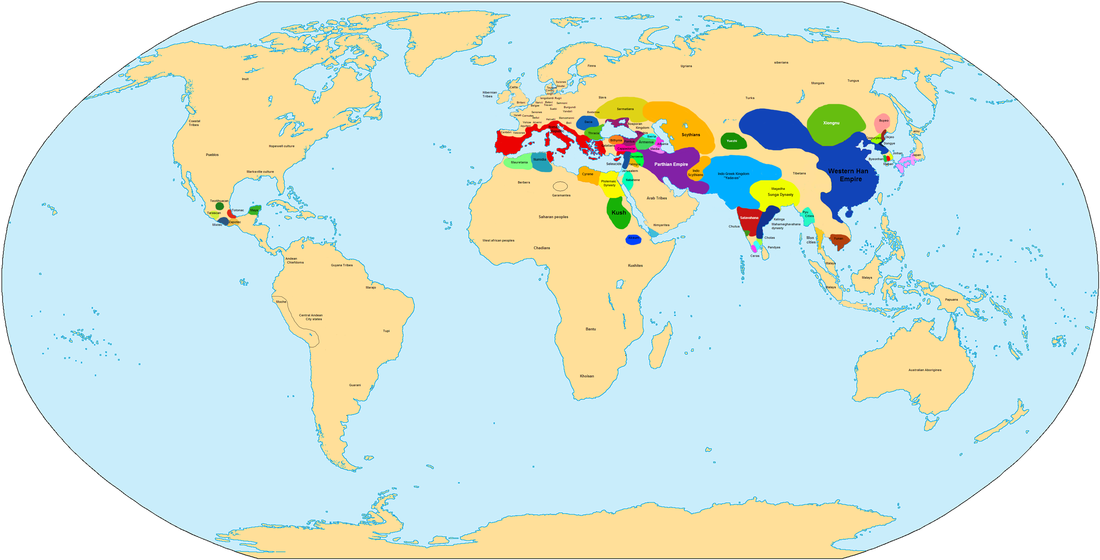100s BC (decade)
Decade From Wikipedia, the free encyclopedia
This article concerns the period 109 BC – 100 BC.

109 BC
By place
Roman Republic
- A Roman army under Marcus Junius Silanus is defeated by the Cimbri and Teutones near the river Rhône.
Asia
- Emperor Wu of Han inspects the Han Empire, traveling 9,000 km (5,600 mi). He also sends diplomats to search for the legendary Penglai Island.[1]
- Han campaigns against Dian: Emperor Wu launches a new campaign against the Dian Kingdom and establishes the Yizhou commandery in Yunnan during the dynasty's expansion southward.
- Han invasion of Gojoseon
- After She He, a Han envoy, murders a minor king of the vassal state of Gojoseon and is rewarded by Emperor Wu with a military command, Ugeo, the king of Gojoseon, attacks and kills She He.
- Autumn – Emperor Wu orders the invasion. The Han general Yang Pu crosses the Yellow Sea and marches on the capital Wangxian (Pyongyang) but is defeated outside its gates. Another general, Xun Zhi, invades overland but fails to make headway.
- Peace negotiations are initiated by Emperor Wu but fail due to mutual suspicion.[2]
- The Han general Zhao Ponu and 700 cavalrymen are victorious in the Battle of Loulan in the Tarim Basin, capturing the king of Loulan in the first Han intervention west of the Hexi Corridor.[3][4]
Births
108 BC
- Lucius Sergius Catilina, Roman politician (d. 62 BC)
106 BC
- Cicero, Roman politician and author (d. 43 BC)[22]
- September 29 – Pompey the Great, Roman general and politician (d. 48 BC)[23]
- Servius Sulpicius Rufus, Roman politician (d. 43 BC)
105 BC
- Decimus Laberius, Roman nobleman and Latin writer (d. 43 BC)
- Tiberius Claudius Nero, Roman politician and general
- Marcus Atius Balbus, Roman praetor and governor (d. 51 BC)
104 BC
- Julia, mother of Mark Antony
- Servilia, mistress of Julius Caesar
103 BC
- Marcus Furius Bibaculus, Roman poet.[24]
102 BC
- Quintus Tullius Cicero, Roman general and statesman (d. 43 BC)
101 BC
- July 13–Julius Caesar[25]
100 BC
- Julius Caesar, Roman general and politician (d. 44 BC)[26][27]
- Titus Labienus, Caesar's chief lieutenant in the conquest of Gaul (d. 45 BC)
Deaths
109 BC
- Paerisades V, king of the Bosporan Kingdom (approximate date)
- Sames II Theosebes Dikaios, king of Commagene
108 BC
- Marcus Livius Drusus (the Elder), Roman consul
- Ugeo of Gojoseon, king of Wiman Joseon (Korea)
107 BC
106 BC
- Wei Qing, Chinese general of the Han dynasty
105 BC
- Marcus Aurelius Scaurus, Roman politician and general, executed as a prisoner of war in the advent of the Battle of Arausio
104 BC
- Dong Zhongshu, Chinese scholar who promoted Confucianism at the central court of the Han dynasty (b. 179 BC)
- Gnaeus Domitius Ahenobarbus, Roman consul and general
- John Hyrcanus, prince and high priest of Judea (b. 164 BC)
- Jugurtha, king of Numidia (execution by Rome) (b. c. 160 BC)[29]
103 BC
- Aristobulus I, king of Judea.[30]
- Gaius Lucilius, Roman satirist
- Khallata Naga of Anuradhapura, king of the Anuradhapura Kingdom
101 BC
- Boiorix, king of the Cimbri (killed at the Battle of Vercellae)
- Cleopatra III, queen of the Ptolemaic Kingdom (assassinated by her son Ptolemy X Alexander I)
100 BC
- Cornelia, mother of Tiberius Gracchus (b. c. 190 BC)
- Gaius Memmius, Roman politician
- Gaius Servilius Glaucia, Roman politician
- Lucius Appuleius Saturninus, Roman politician
- Salvius Tryphon, Rebel slave
- Theodosius of Bithynia, Greek astronomer and mathematician (b. c. 169 BC)
Notes
- October 2 in the Julian calendar.
References
Wikiwand - on
Seamless Wikipedia browsing. On steroids.
